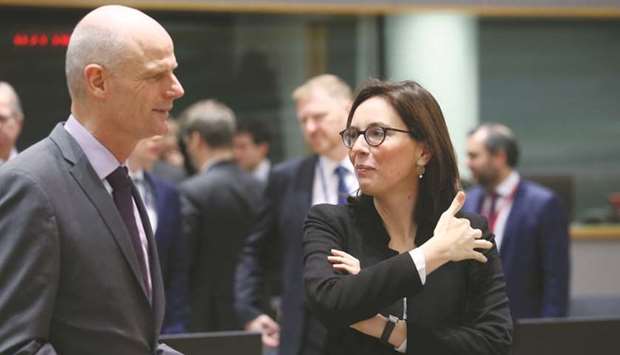The EU and Britain yesterday adopted their respective detailed negotiating rules ahead of talks on future ties amid European warnings that London must first implement the treaty easing the terms of Brexit.
The talks are to begin next week under a cloud of evaporating trust and incompatible demands.
They are expected to go to the end of the year, corresponding to a transition period set out under the Brexit withdrawal agreement struck late 2019 that London has ruled out extending.
Britain left the EU at the end of January under that treaty and will be regarded as a non-EU “third country” in the negotiations even though it still trades like an EU member until the end of December.
EU ministers in Brussels signed off on a mandate emphasising that Britain has to mirror European standards if it wants its goods to continue to have tariff-free access to the huge single market.
British ministers in London within hours approved their own approach.
Prime Minister Boris Johnson’s spokesman said its goal “is to ensure we restore our economic and political independence on January 1, 2021” — meaning Britain intends to set its own norms irrespective of EU rules.
“At the end of this year we will be leaving the (EU’s) single market and customs union and taking back control of our own laws and our own trade,” the spokesman said.
Talks will begin in Brussels on next Monday, he said, with a second round pencilled in to take place in London later in March.
The outcome of the talks is uncertain.
“The time pressure is immense and the interests are huge,” Dutch Foreign Minister Stef Blok said ahead of the Brussels meeting with counterparts.
“It’s a very complicated treaty. It will be very hard work, a tough road ahead,” he said.
Without an accord on the new relationship, trade between the EU and Britain would revert to a bare-bones arrangement under WTO rules, causing economic pain on both sides, but especially in the UK. Britain has nonetheless signalled it is willing to walk away rather than obey EU diktats, saying doing things its own way was the whole point of Brexit.
The EU, however, fears that without a “level playing field”, the UK might seek a competitive edge over Europe by undercutting its tax, environmental and labour standards.
France in particular hardened the EU position, aiming to heighten trade friction the more the UK diverges from EU standards, as well as putting access for EU fishing boats to British waters at the heart of the mandate.
Johnson’s government, meanwhile, says British ports are not being readied to carry out checks on goods between Britain and its Northern Ireland territory, despite that being a requirement of the withdrawal agreement.
Irish Foreign Minister Simon Coveney warned that “the implementation of agreements that have already been struck are the test of good faith and trust — and without good faith and trust, building a future relationship is not going to be easy”. Germany’s EU minister, Michael Roth, was equally blunt. “My message is crystal clear to our friends in London: keep your promises.”
Under the withdrawal agreement, a protocol on Northern Ireland is to remain in place unless a devolved local government decides otherwise years down the line.
Until then, the British territory is essentially to remain under EU single market rules, with a border for goods down the Irish Sea.
But that is anathema to Johnson, who fears Northern Ireland could become de facto a part of Ireland, an EU member state. He has repeatedly insisted that there will be no checks on goods going between Britain and Northern Ireland.
Last weekend, the Sunday Times quoted an unnamed “senior source” in his government saying the British negotiating team was looking at ways aimed at “not obeying the Northern Ireland protocol”. For the future relationship, Britain is asking for a similar free trade agreement to the one Canada has with the EU, rejecting Europe’s arguments that the UK’s proximity, size and economic interconnectedness with the continent require stricter controls.

Dutch Foreign Minister Stef Blok (left) and French Junior Minister for European Affairs Amelie de Montchalin attend the General Affairs council in Brussels yesterday. u201cThe time pressure is immense and the interests are huge,u201d Blok said about the trade talks with Britain, ahead of the Brussels meeting with counterparts.
